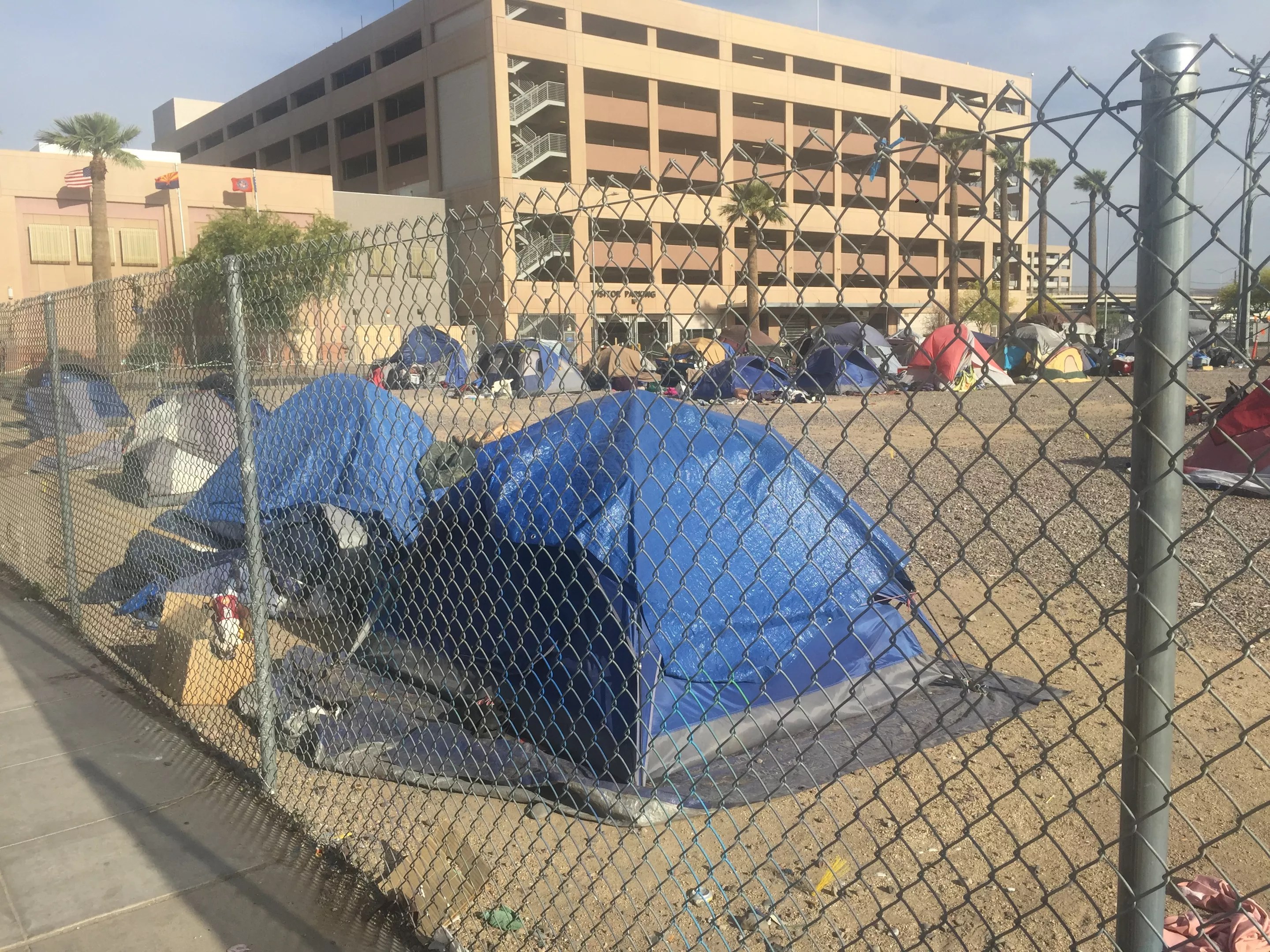
Josh Kelety

Audio By Carbonatix
Maricopa County has begun to close the controversial homeless encampments that were set up on parking lots in downtown Phoenix. The plan, officials say, is to offer other shelter to all of the current residents.
The county opened several lots in the area of South 9th Avenue and West Madison Street for temporary camping spaces with hand-washing stations, security, and portable restrooms for the homeless last spring during the onset of the COVID-19 pandemic. The official reason for creating the sites, county officials said at the time, was to provide homeless people in the neighborhood with a place to stay that followed COVID-19 mitigation protocols. The lots originally had room for around 200 people and are located near the Human Services Campus – a 13-acre complex that provides services like meals, shelter, and legal assistance to homeless people through a variety of different organizations. Moving in was supposedly voluntarily.
But the creation of the lot encampments also coincided with the City of Phoenix spending over $300,000 in federal pandemic funds on chain fencing that blocked dirt easements near sidewalks to prevent people from camping there. An estimated 400 people had previously been camping in those areas. Ash Uss, a human services consultant and former staffer at the André House of Hospitality, a service provider in the area, said that the people who were moved into the lots by Phoenix police officers had previously been camping on the easements. The project was criticized for exposing people to the brutal summer heat and at least five people died at the lots over the past year, according to county officials. Four of those deaths were drug-related, according to the county.
Now, with the end of the pandemic seemingly in sight, county officials have begun winding down the operation. One of the lots was closed on April 7, and the rest of them will be disbanded by June 30, according to county spokesperson Fields Mosley. All of the residents will allegedly be given the option to move to some type of shelter, including motel rooms and neighborhood shelters. New people seeking to live at the lots are now being barred from entry.
“The summer heat is not far away and we have the resources in place to accommodate everyone indoors this year,” he wrote in an email. “Everyone living in the lots will be offered an indoor place to sleep. County staff started communicating with people living on the lots and around the Human Services Campus about the change in late March.”
Since March 22, 29 people who were staying at the lots have gone to “temporary shelters or hotels” while five were sent to permanent housing placements, he added. Another 23 left the lots voluntarily but weren’t headed to any designated shelter.
Amy Schwabenlender, executive director of the Human Services Campus, said that she’s confident that there are enough beds in a combination of existing shelters and motels to offer placements for all of the residents at the lots.
“Some people have gone to shelters, some people have gone to a treatment program, some have gone to bridge housing, some are reconnecting with family or friends, some are picked up by their dad. Every situation is unique,” she said. “It’s going to take the next couple of months to work with everybody. This isn’t about rushing to move people out and say ‘one day you can no longer be here.’ This is to have a plan with each and every single person.”
Others, like Uss, said that ensuring that people aren’t just kicked off the lots is “a lot more challenging in practice.” A camping options along nearby sidewalks are limited with the installment of the chain fencing and gates erected by the City of Phoenix to block off certain alleys in the neighborhood.
And just because officials believe that they have sufficient resources to offer some sort of shelter to residents at the lots doesn’t mean that homelessness in the neighborhood will disappear. The Phoenix City Council recently approved a plan to add 200 more beds at Central Arizona Shelter Services, or CASS (which is located near the lots). But Lisa Glow, CEO of CASS, said that the expansion likely won’t be done by the end of June and that they’re still waiting for the green light from public health officials to resume normal, pre-pandemic operations at the shelter.
“We will still have several hundred people in this neighborhood unsheltered,” Schwabenlender said. “The demand for services and shelter will always exceed the supply available.”
On the ground at the lots, officials appear to be following through on their word. One resident at the lots, 57-year-old Lena Stewart-Maynard, has been living there since they opened last year. Before that she was sleeping on the street along West Madison Avenue off-and-on for the past five years. She told Phoenix New Times yesterday she was informed that morning that she was going to get a housing placement, though she was “unsure” where exactly it would be.
“They’re trying to house who they can,” she said. “Those who have been here longest are getting housing first.”
Stewart-Maynard noted that the “timing” of the closure of the lots has been a little rushed and that people are being told to pack up their things. But she is glad that she’s moving out of the lots, especially after experiencing the heat during last summer.
“I told myself I couldn’t go through another summer like that,” she said.
Another resident, who identified himself as “Taz,” is less excited about the shift. He’s moving to a motel room this week but he said that he would rather stay on the lots if they stayed open. Taz said that living on the lots adds some degree of stability and that a sense of community developed among some of the residents.
“I’m sad, yeah. I gotta leave some people I just started to get to know,” he said. “Some of these cats are real cool.”